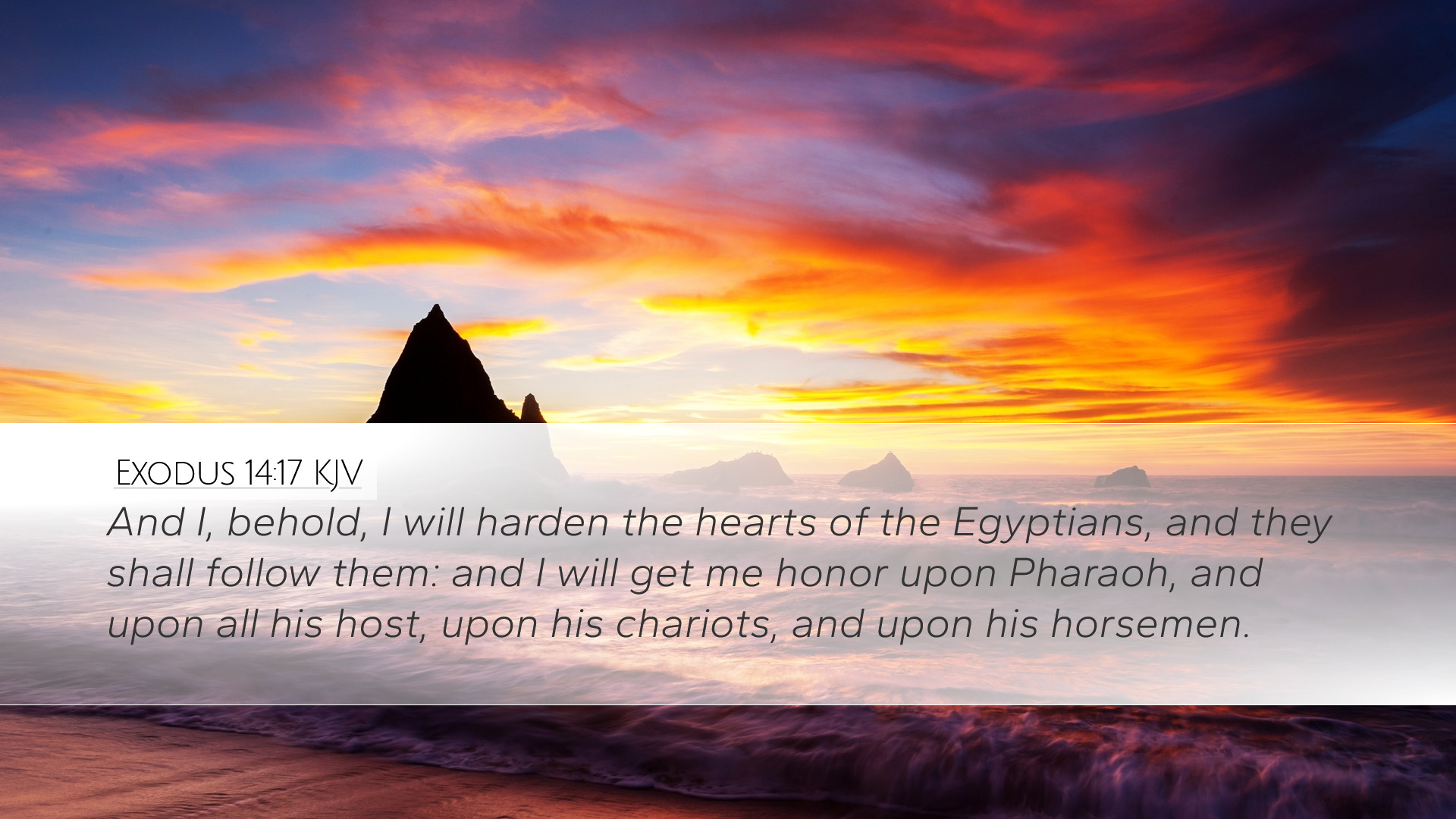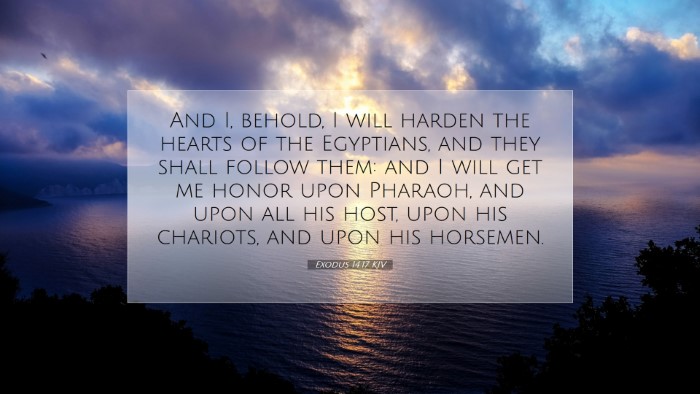Exodus 14:17 Commentary
Verse Reference: Exodus 14:17 - "And I, behold, I will harden the hearts of the Egyptians, and they shall follow them: and I will get me honour upon Pharaoh, and upon all his host, upon his chariots, and upon his horsemen."
In this pivotal verse from the book of Exodus, the Lord speaks to Moses, reassuring him of His sovereign plan to deliver the Israelites while simultaneously demonstrating His power over Pharaoh and the Egyptian army. This verse encapsulates profound themes of divine sovereignty, judgment, and the purpose of God's actions in history.
The Sovereignty of God
The fundamental tenet displayed in this verse is the sovereignty of God. He declares His intention to harden the hearts of the Egyptians, which emphasizes His control over human decisions and circumstances. Commentators like Matthew Henry elucidate that God is often seen in Scripture as manipulating human hearts to fulfill His divine purposes, illustrating that even those who resist His will are instruments in His grand design.
Albert Barnes notes that the hardening of hearts serves as a demonstration of God's might and the inevitable downfall of those who oppose Him. This assertion that God actively participates in the affairs of men helps scholars understand the broader implications of divine intervention in historical events.
God's Purpose: Honor and Glory
The latter part of the verse emphasizes God's intention to receive glory and honor through the impending confrontation with Pharaoh's army. The phrase "I will get me honour" indicates that the events about to unfold are not arbitrary but serve a higher purpose: the glorification of God's name among the nations.
Adam Clarke points out that this pursuit of glory is consistent throughout Scripture. The Lord aims to reveal His nature to both the Israelites and the Egyptians, showcasing His power, majesty, and justice. This incident is pivotal not only for Israel's identity but also for the surrounding nations who would hear of these acts and recognize the God of Israel as supreme.
Human Responsibility and Divine Sovereignty
A significant theological discussion arises from the interplay between divine sovereignty and human responsibility. While God hardens the hearts of the Egyptians, it does not absolve them of their choices or moral accountability. The context shows that Pharaoh’s rebellion stemmed from his hardened will, which aligns with God's judgment (as noted by Matthew Henry).
Albert Barnes reinforces this point by suggesting that God's hardening does not negate human freedom; rather, it allows the full extent of Pharaoh's malevolence to manifest, thus ensuring God's justice prevails. This examination leads theologians to appreciate the mystery of divine providence intertwined with human agency.
Theological Implications
-
Judgment and Mercy: The verse reflects both judgment for the Egyptians and mercy for the Israelites. God’s action is twofold: it brings about the liberation of His people while simultaneously executing judgment on an unrepentant oppressor.
-
Encouragement in Human Trials: For the oppressed, this passage serves as an encouragement. God's promises to act decisively on behalf of His people reassure them that He is at work, even when circumstances seem dire.
-
A Revelation of God's Nature: Through His dealings, God reveals aspects of His character—His justice, His power, and His commitment to redeeming His people, which are essential for a nuanced theological understanding.
Historical Context
Understanding the historical context of Exodus 14 is vital for deeper engagement with the text. The Israelites were in dire conditions, having been enslaved for generations. God’s declaration in this verse situates the Exodus narrative within the broader story of redemption—the archetype of salvation that resonates throughout the Scriptures.
Adam Clarke emphasizes that the severity of God’s actions against Egypt serves as a foreshadowing of ultimate spiritual deliverance available through Christ. The hardening of Pharaoh is seen as a profound warning against pride and resistance to divine authority.
Application for Today
For modern readers, this verse holds numerous applications. It challenges pastors and theologians to reflect on the nature and sovereignty of God within their ministries, affirming that God is still active in human history and works all things according to His purposes.
Furthermore, students of the Word are prompted to recognize the tensions between divine sovereignty and human choice, a theme that remains relevant in theological discourse today. Noting the promise of divine deliverance encourages believers to trust in God’s faithfulness, even in perilous situations.
Conclusion
Exodus 14:17 serves as a stark reminder of God’s sovereignty over nations, His commitment to His people, and the honor He seeks in the world. The insights from the public domain commentaries by Matthew Henry, Albert Barnes, and Adam Clarke provide invaluable perspectives that enrich our understanding of this critical moment in biblical history. It encourages a posture of worship, reverence, and trust in God's perfect timing and plan.


